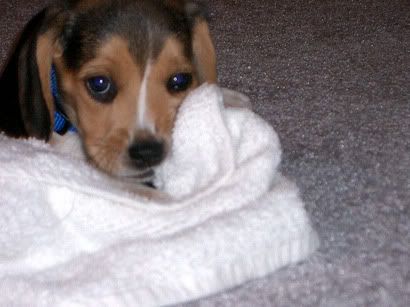Why would you want to spook your dog, yell at your dog, spray things at him, get him with vinegar, scare him with loud noises? I would never spray vinegar at my dog. It could be injureous if it got into the eyes. What do you want your dog to think of you? Do you want a dog who respects and trusts you? That, to me is the first and very most important foundation of learning, the most important piece of training "equipment" there is.
To end undesireable behaviors, remove the reward or payoff and do like Bridey says. End all playtime if the dog is biting on you. Give an alternative chew toy and praise for chewing that.
What do you do when he whines? If you talk to him, whether you say, "no" or any word, if you look at him, if you make any reaction to his whining, THAT IS a payoff/reward and so he'll be more likely to repeat that. If nothing good comes from his whining, it will tend to diminish and stop.
Barking is harder because it is such a communication for a dog, especially a Beagle. You can teach "enough." I assume you'd want the dog to bark sometimes, as an alert to a stranger coming to your house or to warn you of something. So, "no" is not a good command because that means he is NEVER to bark. I use "enough" and when my dogs bark too much, I've checked....nothing there, I go to them, distract them and upon stopping, I say, "enough." (that's when they're first learning. They don't know the word yet, so to show them what it means, they need to stop first, so they'll associate the word with stopping barking. Later you will be able to say the word, "enough" while they're barking) When they stop, I praise lavishly, "goooooood enough." That way they know that stopping when I say that, is what I want and it's worth their while because they get all kinds of praise and even a treat...not just any treat, but a very tasty one. You have to be consisant and carry out what command you use. Don't give a command that you can't enforce.
There are a few tips I hope will be of some use. Just remember that it's more effective to show your dog what you DO want and reward, make it worth his while than it is to yell, spray things at or any other punishment. Punishment doesn't show the dog what he's suppose to do. Sometimes we think a dog should understand what to do, but they don't. So to punish what they're not suppose to do doesn't really help. And it makes the dog distrust you and only want to "work" to avoid punishment, not to receive something good. A dog working for reward learns faster and better than one who works out of fear or avoidance of punishment.


